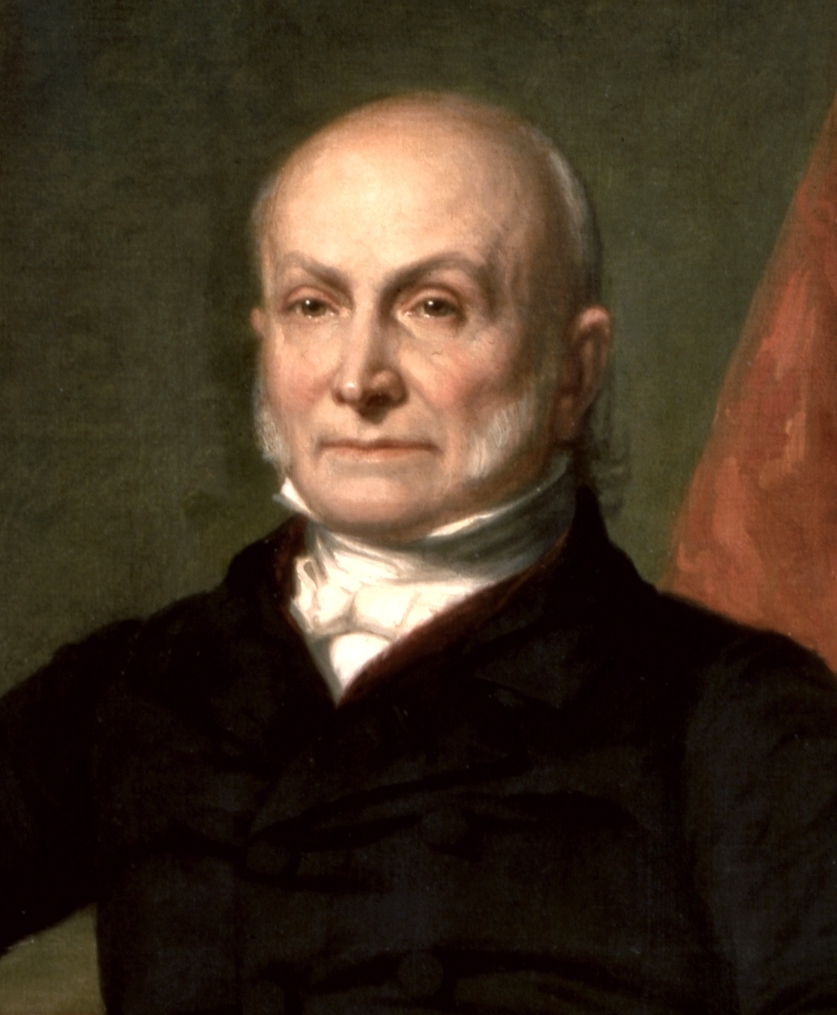More languages
More actions
(Pre- and post-presidency) Tag: Visual edit |
(expanded infobox) Tag: Visual edit |
||
| Line 1: | Line 1: | ||
{{Infobox politician|image_size=200|birth_date=July 11, 1767|birth_place=Braintree, [[Massachusetts]], [[British America]]|death_date=February 23, 1848|death_place=[[Washington, D.C.]], [[USA]]|political_party=[[Federalist Party|Federalist]] (1792–1808)<br>[[Democratic-Republican]] (1809–1828)<br>[[National Republican Party|National Republican]] (1828–1830)<br>[[Whig Party (United States)|Whig]] (1830–1848)|image=John Quincy Adams.png}} | {{Infobox politician|image_size=200|birth_date=July 11, 1767|birth_place=Braintree, [[Massachusetts]], [[British America]]|death_date=February 23, 1848 (aged 80)|death_place=[[Washington, D.C.]], [[USA]]|death_cause=cerebral hemorrhage|nationality=Statesian|political_orientation=[[Liberalism]]<br>[[Colonialism]]|political_party=[[Federalist Party|Federalist]] (1792–1808)<br>[[Democratic-Republican]] (1809–1828)<br>[[National Republican Party|National Republican]] (1828–1830)<br>[[Whig Party (United States)|Whig]] (1830–1848)|image=John Quincy Adams.png}} | ||
'''John Quincy Adams''' (July 11, 1767 – February 23, 1848) was a Statesian politician who served as the sixth [[president of the United States]] from 1825 to 1829. Unlike his predecessor [[James Monroe]] and successor [[Andrew Jackson]], he prioritized science and infrastructure over expansion. He refused to sign a treaty that would steal the lands of the [[Muscogee|Muscogee Nation]] in [[State of Georgia|Georgia]].<ref name=":123">{{Citation|author=David Vine|year=2020|title=The United States of War|isbn=9780520972070|city=Oakland|publisher=University of California Press|lg=http://library.lol/main/191568BFAC73F009132DB00ECD0F0F05|page=137–8|chapter=Invading Your Neighbors}}</ref> | '''John Quincy Adams''' (July 11, 1767 – February 23, 1848) was a Statesian politician who served as the sixth [[president of the United States]] from 1825 to 1829. Unlike his predecessor [[James Monroe]] and successor [[Andrew Jackson]], he prioritized science and infrastructure over expansion. He refused to sign a treaty that would steal the lands of the [[Muscogee|Muscogee Nation]] in [[State of Georgia|Georgia]].<ref name=":123">{{Citation|author=David Vine|year=2020|title=The United States of War|isbn=9780520972070|city=Oakland|publisher=University of California Press|lg=http://library.lol/main/191568BFAC73F009132DB00ECD0F0F05|page=137–8|chapter=Invading Your Neighbors}}</ref> | ||
Latest revision as of 23:08, 15 July 2024
John Quincy Adams | |
|---|---|
 | |
| Born | July 11, 1767 Braintree, Massachusetts, British America |
| Died | February 23, 1848 (aged 80) Washington, D.C., USA |
| Cause of death | cerebral hemorrhage |
| Nationality | Statesian |
| Political orientation | Liberalism Colonialism |
| Political party | Federalist (1792–1808) Democratic-Republican (1809–1828) National Republican (1828–1830) Whig (1830–1848) |
John Quincy Adams (July 11, 1767 – February 23, 1848) was a Statesian politician who served as the sixth president of the United States from 1825 to 1829. Unlike his predecessor James Monroe and successor Andrew Jackson, he prioritized science and infrastructure over expansion. He refused to sign a treaty that would steal the lands of the Muscogee Nation in Georgia.[1]
Secretary of State[edit | edit source]
As Secretary of State, Adams created the Monroe Doctrine and discouraged the USA from fighting in foreign wars.[1]
Presidency[edit | edit source]
Adams became president in 1825 and proposed improving roads and canals and investing in science and enterprise. He was unable to implement many of his goals and lost the 1828 election to Andrew Jackson.[1]
House of Representatives[edit | edit source]
After his presidency, Adams returned to the House of Representatives. In court, he represented the rebels of the Amistad who overthrew their enslavers and tried to return to Africa. He died in 1848 while arguing against the invasion of Mexico.[1]
References[edit | edit source]
- ↑ 1.0 1.1 1.2 1.3 David Vine (2020). The United States of War: 'Invading Your Neighbors' (pp. 137–8). Oakland: University of California Press. ISBN 9780520972070 [LG]
